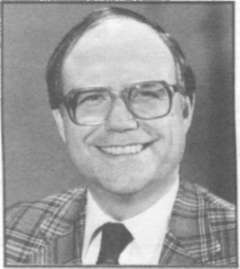 |
Home | Search | Browse | About IPO | Staff | Links |
 |
Home | Search | Browse | About IPO | Staff | Links |
|
Politics Horseshoes, hand grenades and legislative races  By CHARLES N. WHEELER III "Close only counts,'' an old adage says, "in horseshoes and hand grenades." A few weeks ago, though, Illinois House Democrats added a third category: legislative races. On a 67-to-49 straight party-line vote, the majority Democrats ousted Rep. Gerald C. Weller (R-Morris) and returned his 85th District seat to its former occupant, Rep. Ray A. Christensen (D-Morris). Weller had been certified as a four-vote winner in the November general election, but a House Elections Committee recount, which the roll call ratified, found a three-vote edge for Christensen. Although the vote and the lengthy debate preceding it provided the first dramatic interlude of the 85th General Assembly, it could be argued the outcome of the election contest was of little political consequence, except to the candidates themselves. In legislative terms, bringing back Christensen, a five-term backbencher, was hardly critical to the Democratic majority; there's just not that much more you can do with 68 votes than you can do with 67. On the other side of the aisle, while Republicans personally may miss Weller, a promising freshman, it's difficult to envision the roll call on which his vote would have provided the margin of victory for his 50 fellow Republicans. Given such apparently paltry stakes, legislative watchers wondered why House Speaker Michael J. Madigan (D-30, Chicago) chose to count Weller out, thus risking possible reprisals from infuriated Republicans. The best explanation may have come unwittingly from one of Weller's allies, Rep. Ron Stephens (R-110, Caseyville), who made a special plea during the debate to "targets," legislators from swing districts. "I'd like all the targets to truthfully ask themselves how they'd feel if the same standards used here applied to their elections," Stephens said. "Unseating a member using arbitrary standards and ignoring the law should make all of us tremble in the face of a not-too-distant close election." Ironically, the recount may have conveyed the flip side ot that message to Democratic targets, especially downstaters. Transforming Christensen into a political Lazarus clearly showed Madigan's determination to bring his members back. Demonstrating such commitment can only strengthen party unity and loyalty. Nor is it likely that hard feelings from the controversy will make partisan cooperation impossible later this spring. Most Republicans, like their Democratic colleagues, have legislative agendas and district concerns too important to sacrifice in symbolic protest: besides, Democrats have enough votes to pass whatever they desire without GOP help. Furthermore, despite Republican charges that Democrats "stole" the seat, the recount was hardly an open-and-shut case of larceny. Ultimately, the outcome turned on the fate of 105 ballots to which attorneys for either side objected for various reasons, after the panel's recount of undisputed ballots gave Weller an eight-vote margin. Thirteen of the contested ballots, for example, were not initialed by election judges; 28 others had extraneous markings. On 22 punch card ballots, all or some of the "chad,'' the tiny rectangle a voter punches out to indicate his choice, was still remaining. In determining whether to count each disputed ballot, the committee had to reconcile two conflicting goals — insuring the franchise to each qualified voter and respecting the procedural safeguards intended to assure honest elections (although both sides agreed there was no actual fraud.) Should a voter be disenfranchised, for example, if a judge forgets to initial his ballot? Yes, argued Christensen initially after a discovery recount found one such ballot for Weller; no, said Weller. But when the committee recount turned up 13 unitailed ballots, and the split favored Christensen 8-to-5, the roles were reversed; Christensen wanted them counted and Weller objected. The committee voted 6-to-4 on partisan lines to count them. 4/May 1987/Illinois Issues Was the Kankakee County voter who made a number of crossing lines in the straight Republican circle on a paper ballot an enfeebled senior citizen struggling with a dull pencil, as Republicans suggested? Or was it someone who marked Republican on impulse, then had second thoughts and scratched it out, as the Democrats contended and the committee voted, 6-to-4? And when Democrats counted partially perforated punch cards by holding them up to the light to look for breaks, was it merely an effort to make sure every voter's intent was honored, or, as Republicans charged, an unauthorized and illegal procedure? In the end, the panel's Democratic majority made enough judgment calls in Christensen's favor to give him the election; of the 67 disputed ballots that were counted, 39 went to Christensen and 28 to Weller. Whatever its merits, the outcome should have surprised no one. After all, does the first-base coach ever agree when the batter's called out on a bang-bang play at first? Unlike baseball, however, there's no impartial umpire to call close legislative election contests. Instead, it's left up to the chamber, which realistically means the majority party, hardly an objective group. So the first lesson for those troubled by the Christensen-Weller verdict should be that legislative election contests should be settled by the courts or some other disinterested entity, not lawmakers themselves. The recount controversy also strengthens the case for appointed precinct administrative boards responsible for manning the polls, voter registration and canvassing and other election-related activities. Presumably, these permanent, professional election judges would be less likely to make the kinds of ministerial mistakes the recount turned up in the 85th District. While similar errors occur in every election, in this case, the miscues proved to be the factors on which the result turned. Meanwhile, Jerry Weller may be able to find some solace in this reminder: The filing date for the 1988 elections is only a little more than seven months away. May 1987/Illinois Issues/5 |
|
|